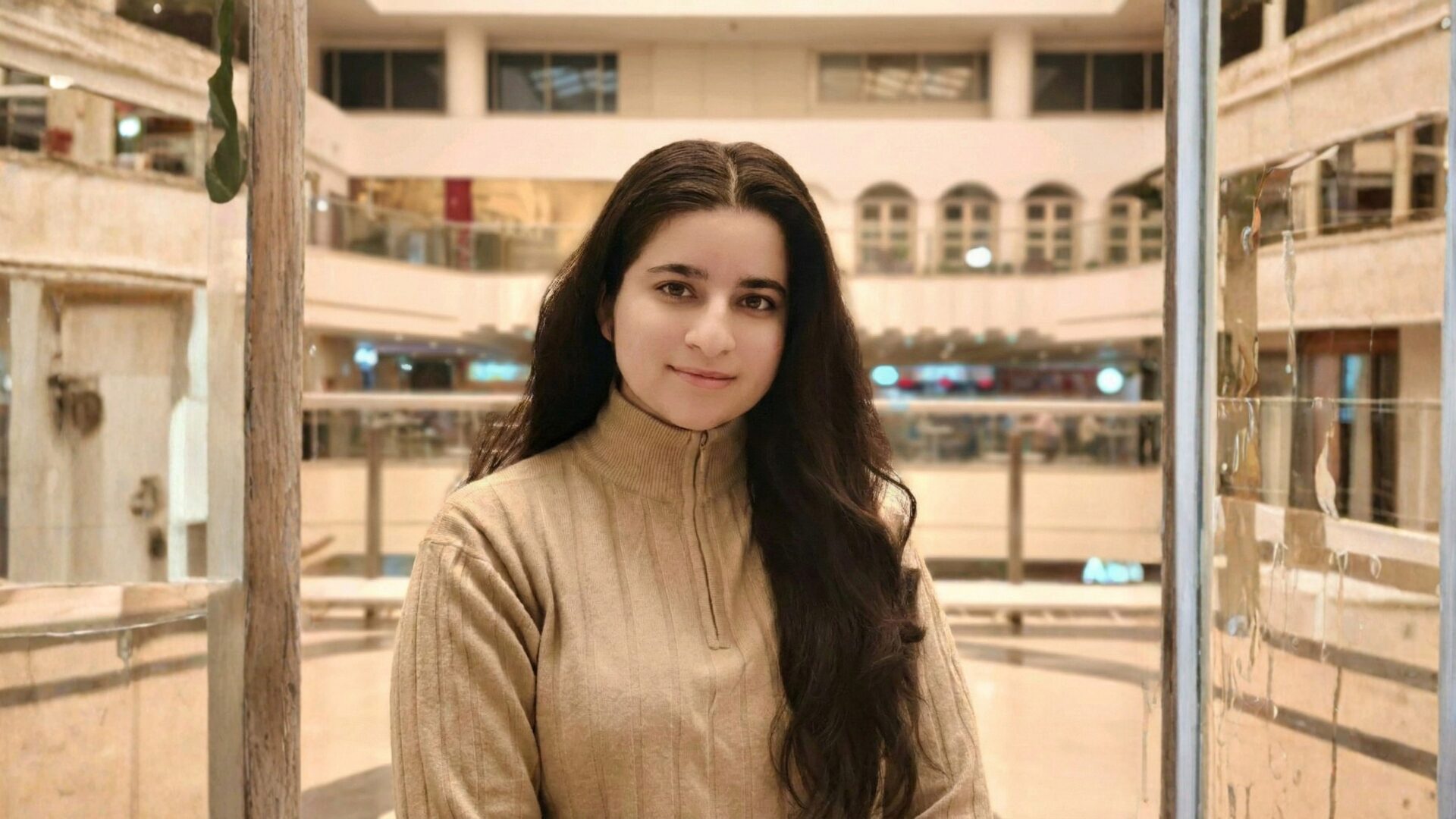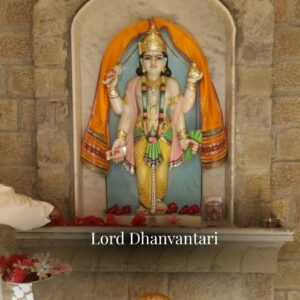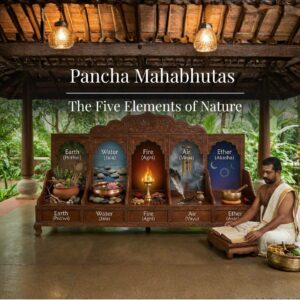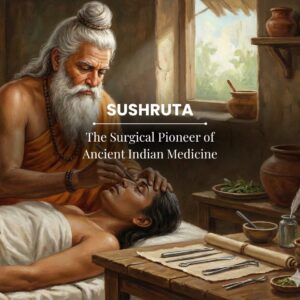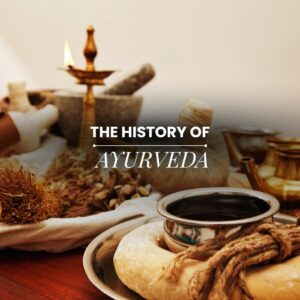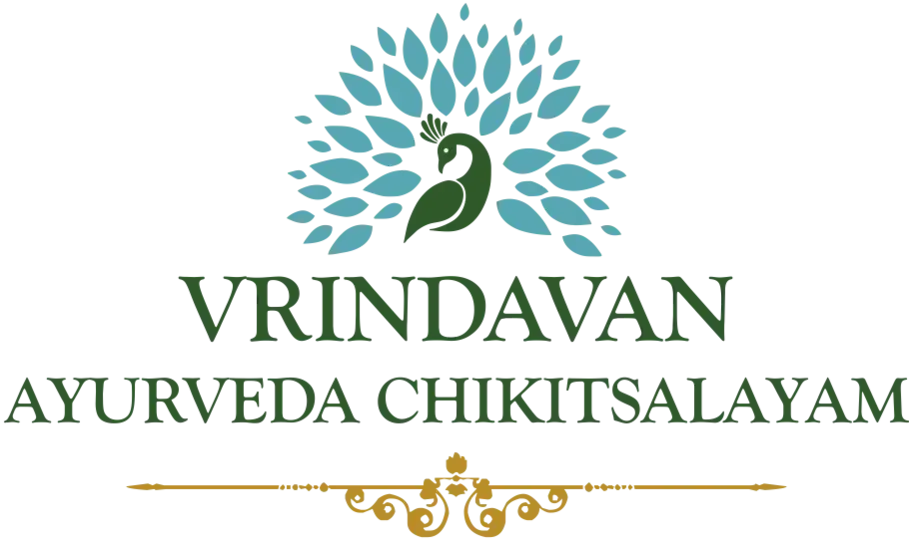Do you have red or bluish-purple lines popping out on your legs? Those veins can be varicose. Varicose veins are becoming a common problem, especially in middle-aged and elderly people.
If not treated timely, they can potentially lead to health issues. For the treatment of varicose veins, there are many non-surgical and surgical methods available. Ayurvedic treatment for Varicose veins is the most popular option due to its effectiveness and minimal or no adverse effects.
What are Varicose Veins?
Varicose veins are a condition in which the vein becomes dilated, swollen and tortuous. It is primarily a lifestyle disorder. The lower limbs are common sites of varicosity.
Causes of Varicose Veins: The main cause of varicose veins is incompetence of valves and weakness in the walls of veins which lead to venous insufficiency. Predisposing factors for varicose veins includes-
- Prolonged standing
- Pregnancy
- Sedentary lifestyle
- Obesity
- Gut disorders such as constipation and bloating can cause varicose veins
Varicose Ulcers: A Varicose Ulcer is a venous ulcer that forms at a site where a vein bulges due to the backward flow of deoxygenated or impure blood. This site sometimes opens up as an open wound and becomes an ulcer.
Common Symptoms of Varicose Veins
- Bulging veins
- Burning or itching sensation around the veins
- Change in skin tone or discoloration near the veins
- Pain and swelling in the legs
- A sensation of numbness in the feet and legs
- Leg cramps at night
Ayurvedic Treatment for Varicose Veins
In Ayurveda, Varicose Veins have a correlation with “Siraja Granthi,” where “Siraja” refers the veins and “Granthi” implies swelling that resembles a cyst. Vitiation of Vata Dosha (Movement force) results in hardening and loss of elasticity of veins and valves which further increases the blood pressure.
Further, this causes the vein to dilate, and then the valves do not close properly for a long time. It becomes difficult for the muscles to push blood upwards towards the heart which results in backflow of blood. Now blood collects in the superficial veins of the lower limbs resulting in varicosity of veins just beneath the skin surface.
Varicose Veins in Legs Treatment in Ayurveda
One of the most basic concepts in the tradition of Ayurveda is that each person is composed of a unique balance of three doshas. These are: Vata, Pitta and Kapha.
The harmony of the three doshas leads to health or well-being and an unbalanced dosha leads to poor health. The Varicose Veins are caused by the vitiation of Vata Dosha. Ayurveda focuses to pacify aggravated Vata Dosha and detoxify the Raktadhatu (blood cells).
Additionally, the natural supplement for this skin ailment helps in strengthening the walls of veins, and other vessels to promote healthy venous circulation in the body. Ayurveda includes internal herbal supplements and Panchakarma therapies along with dietary changes and lifestyle modification.
Visit Vaidyaratnam Vrindavan Ayurveda Chikitsalayam for Personalized Treatment of Varicose Veins
VVAC is a 150-bed Ayurvedic hospital has been established by Ashtavaidyan Thaikkattu Mooss Vaidyaratnam, Kerala, to serve the growing number of patients in Northern India and beyond. The hospital is located amidst a sprawling estate of 25 acres in Baddi, about 50 minutes from Chandigarh.
Additionally, the hospital has been proven to be one of the best solutions for Varicose Veins issue. It has a decade of experience in providing the best Ayurvedic treatment for varicose veins in legs.
At VVAC, they treat these veins using a customized and holistic approach. Since each person’s body constitution (prakriti) is different, their therapies are customized to meet every individual’s needs.
Ashtavaidyan with expertise in eight different branches of Ayurveda, are equipped to treat any chronic condition, including Varicose Veins. More than a hundred rare herbs, 200 types of medicinal oils and 600 types of medicines are available at VVAC by Vaidyaratnam Kerala.
Our aim is to treat the disease at its root cause and prevent its recurrence. The hospitals offer traditional Panchakarma and other Kerala specialty therapies, under the supervision of expert Ayurvedic Physicians.
Panchkarma Therapies at Vaidyaratnam Vrindavan Ayurveda Chikitsalayam
Abhyanga (Gentle massage): Abhyanga is an Ayurvedic massage therapy and daily application of warm herb-infused oil around the affected part helps to reduce pain and swelling. Abhyanga helps in bringing your doshas back into balance and improves blood circulation.
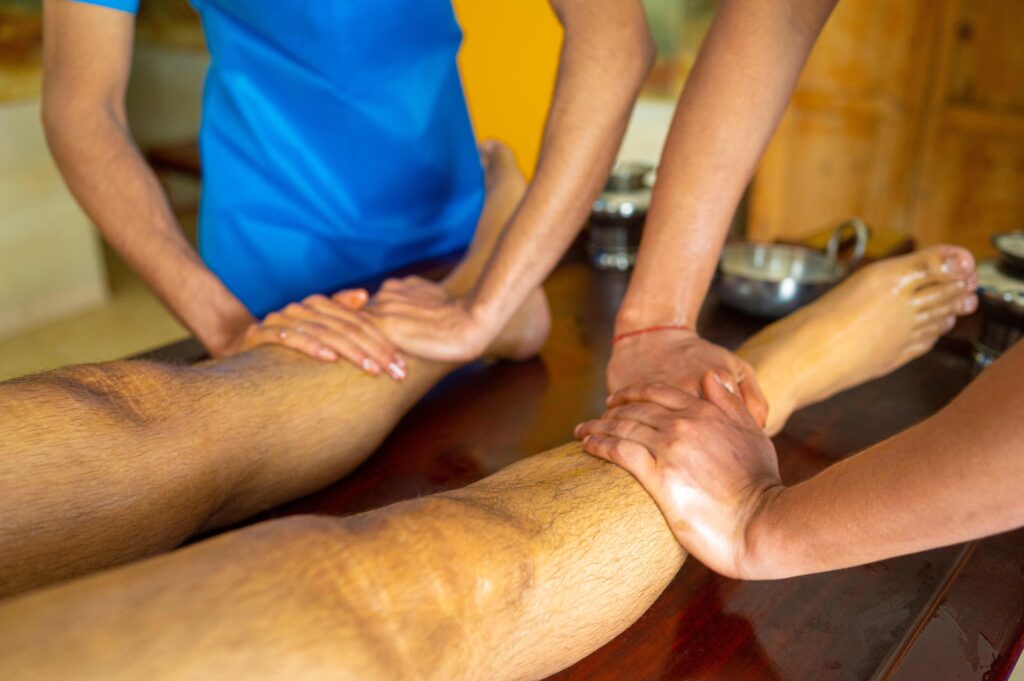
Swedana (Hot Fomentation): In Patrapindasweda, the combination of herbs like Eranda (Ricinus communis), Nirgundi (Vitex negundo), Arka (Calotropis gigantean) etc. are collected and heated in a non-stick pan in herbal oil, along with other ingredients. After that it is tied in a clean cloth to form a bolus of Patra Pinda. The bolus is used for rubbing the body with mild pressure and during the procedure it is frequently dipped in the warm oil. Patrapindasweda supports blood to flow smoothly in upward direction and alleviates the pain and swelling.
Basti karma (Medicated Enema): This Ayurvedic therapy involves administration of natural herbal preparations rectally on a specific schedule. It can be done with the best balancing herbs for Vata dosha to pacify Vata Dosha.
Avagahan karma (Ayurveda Exotic Tub Bath): Dipping the legs in medicated oil or decoction helps in reducing the symptoms of varicose veins.
Siravedhana (Venesection): It is a type of bloodletting by puncturing to eliminate local toxic substances from blood. It supports healthy blood circulation by reducing local engorgement of the pressure and preserves valve competency and elasticity of the veins.
Jaloukavacharana (Leech therapy): It is a bloodletting therapy that aims to promote better blood flow with the help of leeches. Leech naturally secretes a blood thinning compound to maintain the blood flow in the affected area.
Natural Herbs for Varicose Veins
Gotu kola (Centella asiatica): It contains chemical constituents like triterpenic acid which are effective in managing cellulite, venous insufficiency of lower limbs and varicose veins. It helps to stimulate the production of collagen and elastin to strengthen the internal lining and walls of veins.
Guggulu (Commiphora mukul): Guggulu is well known for its anti-inflammatory properties and has been used in Ayurveda to combat many health problems like obesity, the leading cause of varicose veins.
Manjistha (Rubia cordifolia): Manjistha has anti-inflammatory properties that help mitigate swelling and pain in the legs. This herb efficiently balances the vitiated Pitta dosha which helps in blood purification and circulation in the body.
Sariva (Hemidesmus indicus): Sariva root extracts have blood-purifying properties that help eliminate toxins and regulate the circulation of blood in the body. You can also apply it topically on the affected part to ease the symptoms of varicose veins like skin irritation, itching, dryness, dark spots and even skin tone.
Amalaki (Embelica officinalis): Amla and other citrus fruits are rich in vitamin C which is essential for the formation of collagen in connective tissue. Vitamin C deficiency is a prime contributing factor to the complication of varicose veins.
Natural Yoga therapies for the Management of Varicose Veins
Yoga Asanas help to enhance blood circulation throughout the body including the lower limbs. It ameliorates blood circulation to the veins of calves and legs which are the likely spots of varicose veins. Thus, it alleviates the pain, swelling and heaviness in the legs due to varicose veins. Some effective Yoga Asanas for varicose veins are mentioned below:
- Tadasana (Mountain pose)
- Viparita Karani (Legs up the Wall)
- Uttanasana (Standing Forward Bend)
Lifestyle Changes as an Ayurvedic Treatment for Varicose Veins
- Compression stockings help to reduce the pressure in the vein and support the anti-gravitational flow of blood towards the heart.
- Try to move around at least every 30 minutes and avoid prolonged standing or sitting which can make varicose veins terrible.
- Apple cider vinegar can be used externally as well as internally. It helps to detoxify the body and enhances the circulation of blood through the veins.
- Elevating the affected part above heart level while sitting, resting or sleeping
- Losing weight if you are overweight can help reduce pressure on your veins
- Avoid tight-fitting clothing, especially those that are tight around the waist, groin, and legs
- Try to avoid wearing excessively tall, pointy heels for long periods. Choose a shorter heel to help maintain healthy blood circulation.
- Avoid salt as sodium can cause the body to retain excess fluid and put pressure on veins of the affected area.
Diet for Varicose Vein
- Green Leafy green vegetables such as kale and lettuce are excellent sources of magnesium, effective in healthy blood circulation and blood flow.
- Increase the intake of fruits like Apples, Grapes, Cherries, Avocado and Beetroot.
- Raw nuts and seeds are rich in vitamin B3 and niacin, essential nutrients for healthy blood flow.
- Avoid refined carbs, canned foods, foods with added sugar, fried foods, red meat, salty foods, and caffeinated beverages.
- Avoid Bitter foods, Pungent foods like chiles, turnips, and astringent foods like legumes and grains.
FAQs
1. Are there any dietary recommendations to help correct Varicose Veins in Ayurveda?
It is generally advisable to eat a diet that balances Pitta and Vata. Foods that are prepared, warm, and unctuous (i.e., containing a modest quantity of healthy fats like ghee and olive oil) will help balance Vata. You can consume a diet high in fibre, whole grains, dairy products, and sweet fruits, as this will help to balance your Pitta and Vata doshas.
2. Can you heal varicose veins without surgery?
Weak veins can be successfully treated using natural treatments and techniques found in Ayurveda, the traditional Indian medical system. Minimally invasive options like Panchkarma therapies exist to overcome varicose veins and can be treated without surgery. Treatment for varicose veins should be personalized to the individual.
3. Are there any side effects of Ayurvedic treatment for Varicose Veins?
Although Ayurvedic treatments are generally safe, it is still necessary to share any current medications and medical history with the Ayurvedic practitioner to avoid any medicinal interactions or negative effects.
4. Is ayurvedic medicine good to treat the condition?
Many herbal formulations and Panchkarma therapies are used in Ayurvedic treatment for varicose veins to promote natural blood purification.
5. Can Ayurveda provide a complete cure for Varicose Veins?
The main goal of Ayurveda is to effectively manage varicose veins and reduce the associated symptoms. Ayurveda provides long term relief for varicose veins in legs. For personal guidance, you should visit an experienced Ayurvedic practitioner.

